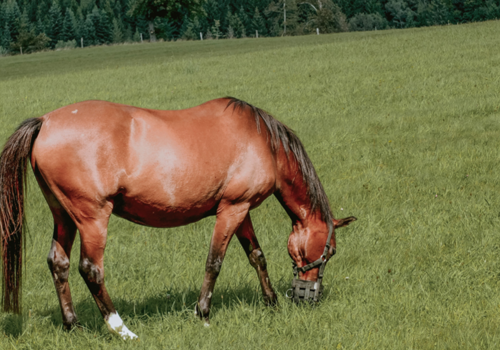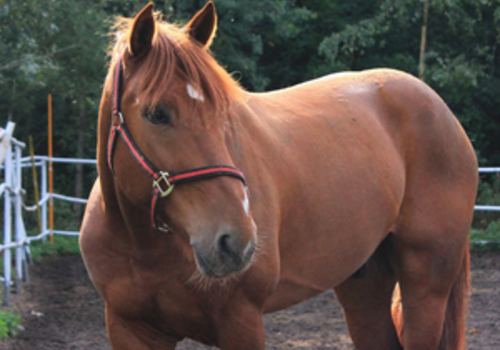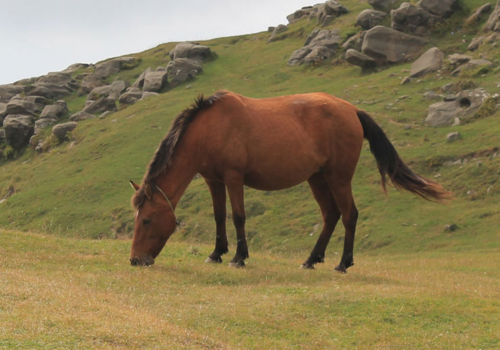The right pasture mix ensures good nutrition, durability, and resilience to heavy hoof traffic while reducing the risk of health issues like laminitis and colic. It is therefore vital for you and your horse to get it right. We’ll show you how in our latest guide.
Consider your Climate and Soil Type
Before selecting your paddock grass seed, consider your local climate and soil conditions. Some grasses thrive in cool climates, while others are better suited for warmer regions. Similarly, soil type—whether sandy, clay-heavy, or loamy—affects how well different grasses establish and grow. Conduct a soil test to determine pH levels and nutrient content, as this can guide your choice of seed and necessary soil amendments.
Choose Horse-Safe Grass Varieties
Not all grass varieties are safe or beneficial for horses. Avoid species high in sugar and fructans, which can contribute to laminitis and metabolic disorders. Instead, opt for lower-sugar, hardy grasses that provide balanced nutrition. Some of the best choices include:
Timothy Grass – a traditional favourite for horse pastures, timothy is palatable, low in sugar, and offers good fibre.
Perennial Ryegrass – fast-growing and palatable, but it should be used in moderation due to its higher sugar content.
Avoid high-sugar grasses like ryegrass in isolation and steer clear of clover-heavy mixes, as clover can lead to health issues like slobbers and photosensitivity.
At Boston seeds, our BS Premier Paddock Grass Seed contains a top quality blend of four varieties of fescue and Timothy. With no ryegrass, this is an ideal paddock grass seed for animals prone to laminitis. Check out our paddock grass advice articles for information about grass for laminitic horses.
Prioritise Durability and Regrowth
Horses graze aggressively, often pulling up grass by the roots rather than just nipping the tops. Because of this, you need pasture grasses that can withstand heavy traffic and regenerate quickly. Mixing several grass species can help create a more resilient pasture that provides steady grazing throughout the year. The BS Classic Horse Paddock Grass Seed contains a mixture of ryegrass varieties, creeping red fescue, and Timothy and is one of our most popular paddock grass seed mixes. This durable seed establishes quickly to give quality, palatable grazing.
Choose a Grass Mix Instead of a Single Variety
A well-balanced mix of grasses is often the best choice for paddocks because it ensures year-round growth and improved resistance to environmental stress. A good horse paddock seed mix will contain Timothy, fescue, and perennial ryegrass for quick establishment. This is the ideal blend to ensure palatability, durability, and continuous regrowth.
Consider Overseeding for Maintenance
Even with the best grass mix, high-use paddocks will experience wear and thinning over time. Regular overseeding—typically in spring or autumn—can help maintain a lush, productive pasture. BS Paddock Repair Grass Seed contains fast germinating perennial ryegrass ideal for overseeding, as it establishes quickly and provides immediate coverage.
Manage Your Pasture for Longevity
Even the best grass seed won’t thrive without proper management. Implementing a rotational grazing system, fertilising appropriately, and avoiding overgrazing will ensure your paddock remains healthy and productive. Regular mowing can also help control weeds and promote even growth. Our paddock advice hub contains a number of articles about how to best maintain your paddock.
Paddock Grass Seed from Boston Seeds
Choosing the right paddock grass seed is essential for maintaining a healthy and sustainable pasture. By selecting a mix suited to your climate, soil, and horse's needs, you can create a durable, nutritious grazing area that supports your horses’ well-being. With proper maintenance and occasional reseeding, your paddock will remain lush and productive for years to come.
To establish a new paddock or to overseed and repair existing grazing, our comprehensive range of grass seed for horse paddocks contains the perfect blend for your needs.
To view our full range, request a catalogue or, if you would like to chat with one of our experts, get in touch via email or give us a call on 01205 280 069.


